How to do your Christmas shopping online while still supporting local indie businesses
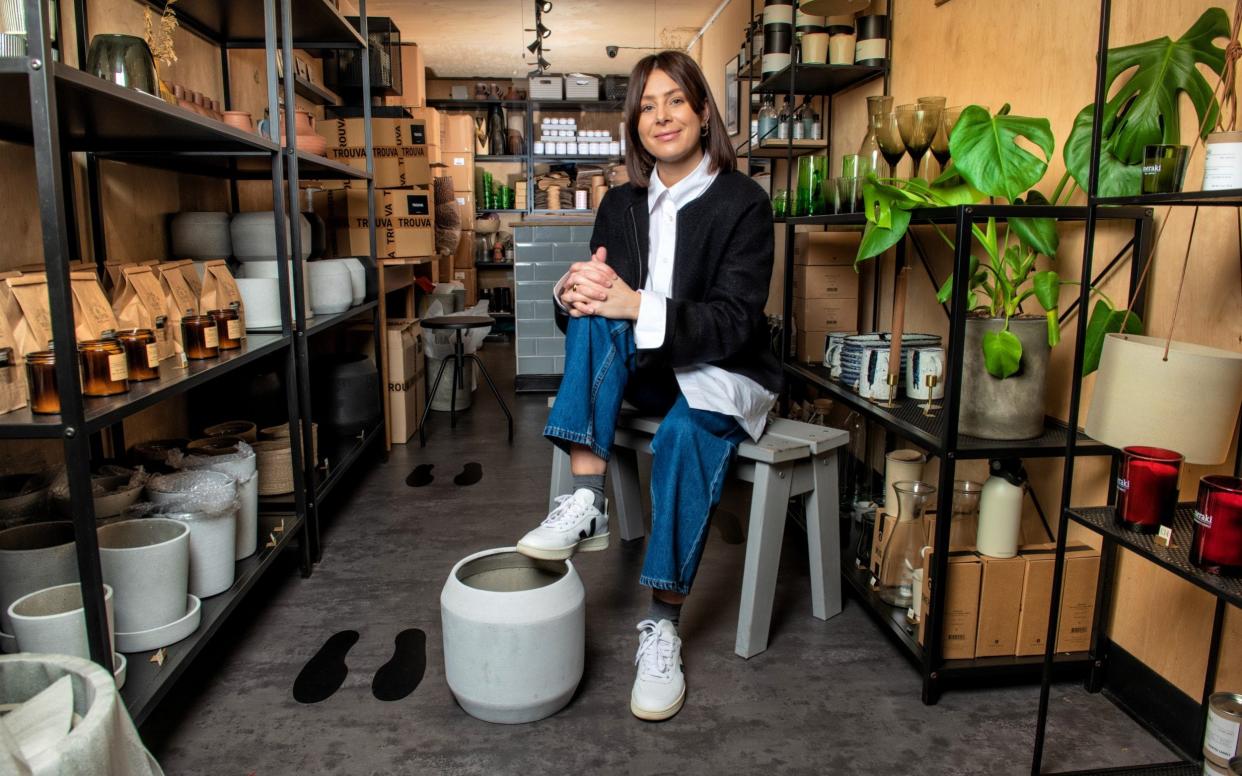
It was Napoleon who reportedly intended to insult the British by calling them a nation of shopkeepers. Napoleon got his comeuppance in the end but now Britain’s shopkeepers face a struggle of their own.
Independent retailers across the UK came through their own Battle of Trafalgar during the spring and summer of 2020, only now to face the Waterloo of a second lockdown during what is usually their busiest period. Their most powerful opponent’s war chest – a swelling incoming tide of online shopping – had already threatened to submerge them this year, with Amazon enjoying its best-ever quarter during lockdown, seeing its profits double to hit their highest level on record.
The slow shift to online shopping has been accelerated by Covid-19. Non- food sales used to be only 20 per cent of total online retail sales, but in July the figure was as high as 50 per cent.
Andrew Goodacre, chief executive of the British Independent Retailers Association, says: “That’s a significant shift in terms of where people are shopping, and that’s not going to change.”
Bricks-and-mortar retailers may have hoped for a reprieve and briefly come up for air at the chance of rescuing the year during the run-up to Christmas, the most important period for small shops.
However, the announcement of the second lockdown, forcing them to shut up shop until Dec 3, has left many with stock they will struggle to sell. Yet many small retailers are determined to rise to the challenge.
Walking along his local high street in Kenilworth, Goodacre was heartened to see shops with notices in the window advising customers that while they were closed, they were still open online and would deliver locally.
“They’re basically saying ‘don’t forget us’, and trying to be as creative as they can. For some that will work,” Goodacre says. “Others, who have waited too long to get into the internet opportunity, are going to be the ones who are caught out.”
The dictum to “shop local” has never been more important. Where and how you shop in the run-up to Christmas will influence what your local high street looks like in the future. A thriving nation of shopkeepers relies on those who use it.
As Goodacre says, it is about the local economy. “If you spend a pound in your local economy it circulates in that. You spend a pound with Amazon and it could be anywhere.”
Not that he’s anti-Amazon, although he admits with a chuckle that his daughter apologised for using it the other day. “Some things, you have to go to them for,” he admits. “They make it so easy and that is their skill. Credit where credit is due.”
Part of the problem, Goodacre says, is that most consumers search online by product rather than store or shop, which means the behemoth Amazon will always come out top, thanks to Search Engine Optimisation.
If you want to support local businesses online, he suggests trying to search instead by shop.
“Seventy-eight per cent of independents have a website. So you can find out what’s available. You don’t have to go with the first thing you see on Google, which will invariably be Amazon.”
It can be a challenge for small shops to connect with their customers online. However, Google’s campaign to urge consumers to leave reviews is an opportunity to help push your favourite bookstore, hardware shop or café up the rankings. Meanwhile, retailers can harness social media to tell their customers what services they are offering during lockdown. At the start of the second lockdown Holly Drew, owner of Darling and Gold, a clothes and homewares boutique on Hackney’s hip Chatsworth Road, sent customers on her mailing list a newsletter telling them politely, but firmly, that unless they showed their support she couldn’t guarantee she would still be around next year.
“While I’m sympathetic to the fact that people have lost their jobs, I’m running a business in an area where houses cost over £900,000, and one of the reasons they’re worth that is because it’s a nice place to live with a lovely street of independent shops.”
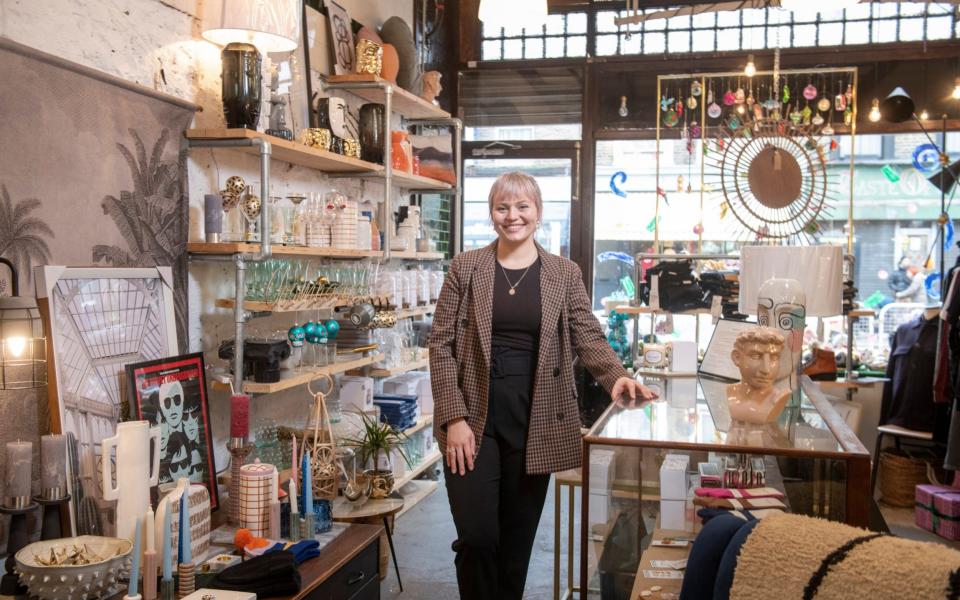
She’s grown tired of people treating the shop like a gallery to augment their weekend stroll; often saying they love the store and then not buying anything. “You can say you love my shop, but if you’re only going to spend £25 a year in it, then you’re not supporting us.” Drew feels that people see independent boutiques like hers as hobby shops. “But I am paying my mortgage and bringing up my children,” she says.
Already she has responded to the crisis by offering click and collect, local delivery, and even Zoom shopping trips. Items start from £5, and she says if all the local community who enjoy having shops like hers in their area bought one thing, it could make the difference between her having to put that closing down sale sign in the window or not.
“I sent that email to say, ‘This is more in your hands than you might want to believe.’ It’s a shop, not a museum.”
Reaching beyond your local community can be an answer in finding a larger consumer base, and third-party websites can help achieve that. Beleaguered booksellers have welcomed the launch of bookshop.org in the UK following its success in the US. Trouva, an online marketplace that connects a network of independent boutiques with a wider global customer base, has seen more than 100 new shops join since March; all were looking for new ways to reach customers even if their physical presence was shut due to lockdowns.
As well as being a larger shop window to the world for independents, Trouva handles everything from inventory management through to marketing and logistics (including worldwide shipping). The website earns commission on the products sold.
“We’re all about independents and enabling them to thrive and part of that is joining forces,” says Alex Loizou, the co-founder of Trouva. “When it comes to the customer experience of the logistics, for example, we’re able to bring the economies of scale that mean you can get your item in the way that you want as a consumer.”
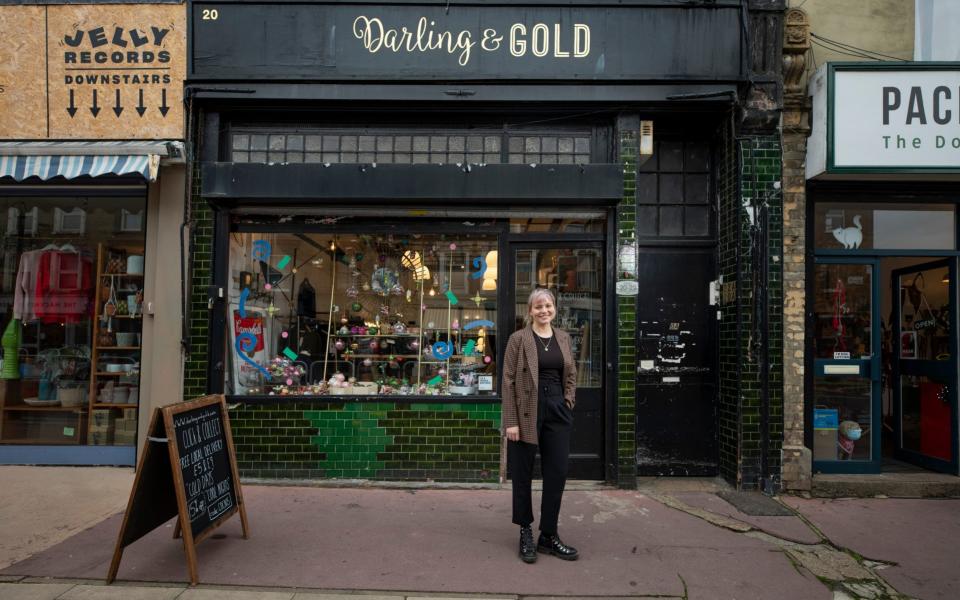
Inspired by the lifestyle boutiques of Shoreditch and Stoke Newington in London, Loizou and his business partners started Streethub eight years ago, which turned into Trouva five years ago. They wanted to bring a flavour of that curated shopping experience to the online world.
“It’s almost like each one of these guys is a gallery. Each one is an experience; it’s not just racks of clothing in a department store.”
While Covid-19 has accelerated the transfer to online, he doesn’t believe the offline world is dead. He credits click and collect as a helpful way of sending people back into the shops.
“The reality is that people will always relish the offline space for shopping as well. We will go back into that space. But new opportunities are coming up, and we will do whatever we can to ensure that, in the new world, these independents play a major role.”
If you love your local high street boutique or store, take some time to get in touch and see how they’re doing. It might be that the best way to show your community some love this Christmas is to wait until they can throw open their doors again and give you a warm welcome. And meanwhile, see if you can shop locally online.
‘The doors are shut for our busiest eight weeks’
Sean Hodgson, 52, and Isabel Humphreys, 44, owners of Coastal Scandi, Wadebridge, Cornwall
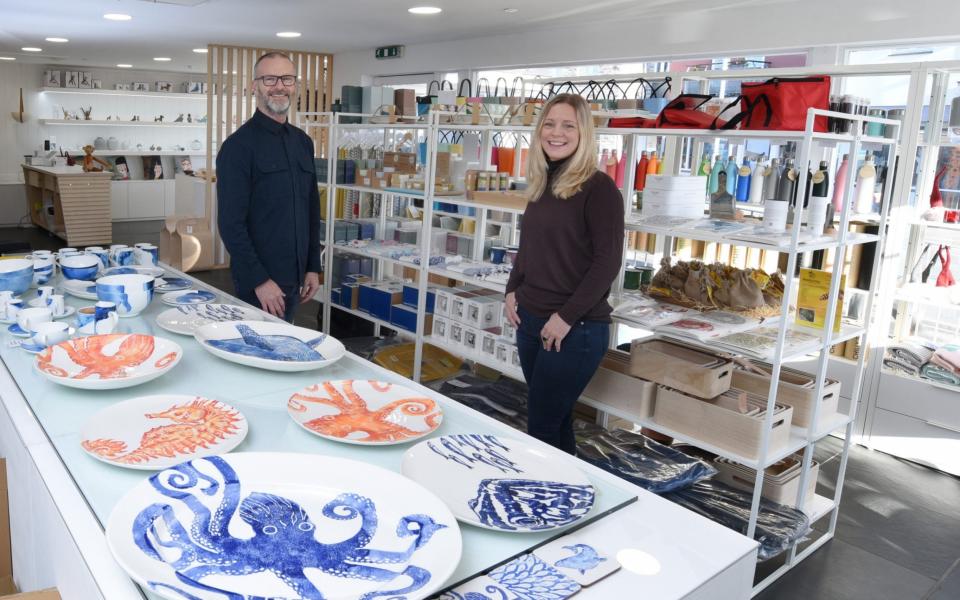
Since the second lockdown started, Sean Hodgson and his partner Isabel Humphreys have been fielding phone calls from loyal customers who just want to ask them how they’re doing. “They ask if we’re OK, and then they ask if they can order some things,” says Hodgson with a video-call smile.
The last lockdown taught his local community the importance of appreciating what they have. “People were coming in and saying, ‘We’re so glad you’re still here!’” Hodgson now makes a point of always shopping with his local stationers, rather than buying supplies online.
“It’s only when you can’t pop out for that local coffee that you start to be grateful for what you’ve got,” he says.
The couple’s shop in Wadebridge sells homewares inspired by Humphreys’ Swedish background (her mother is Swedish) and local Cornish craft.
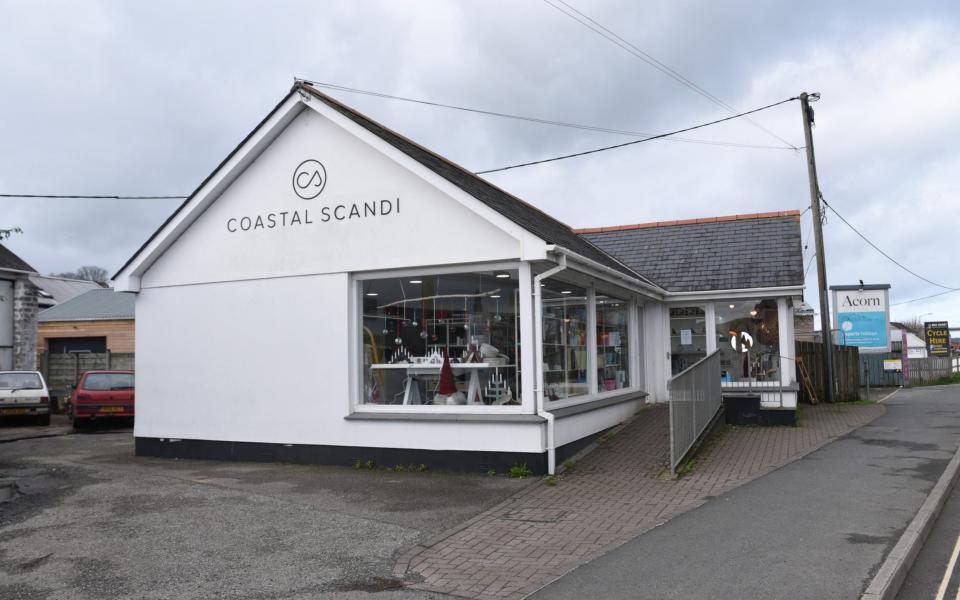
“We try to be sustainable. Everything has a story. We have a range of Swedish brushes from a 120-year-old business that was set up to provide work for blind people,” Hodgson says. “They’re beautiful products, made to last.”
Winter is a quiet period in Cornwall, and when the first lockdown hit Coastal Scandi was gearing up for the start of the season with new stock.
“Then eight days before Easter lockdown happened and now we are here again, having restocked ready for our busiest eight weeks – and the doors are shut.”
Local loyalty aside, Hodgson doubts they would still be trading were it not for the fact they also trade on Trouva: they were early adopters and have been on the site for four years.
While they have their own website, driving non-local trade to the site is an SEO struggle. Sales on Trouva have gone so well that amazingly, while also juggling their five children, they managed to open a second shop in Padstow. However, Hodgson admits he didn’t see the second lockdown coming.
“I thought we’d stick with a regional tier-based system, and as our numbers are so low in Cornwall, I thought we’d be OK.”
Independents like Hodgson have to plan for Christmas well in advance. “We were ordering things in August for delivery last week. We couldn’t not order in case there was another lockdown because we would have had empty shelves.”
‘Any order that comes through is exciting, but I want to keep the local connection’
Hellen Stirling-Baker, 34, owner of Small Stuff, Sheffield
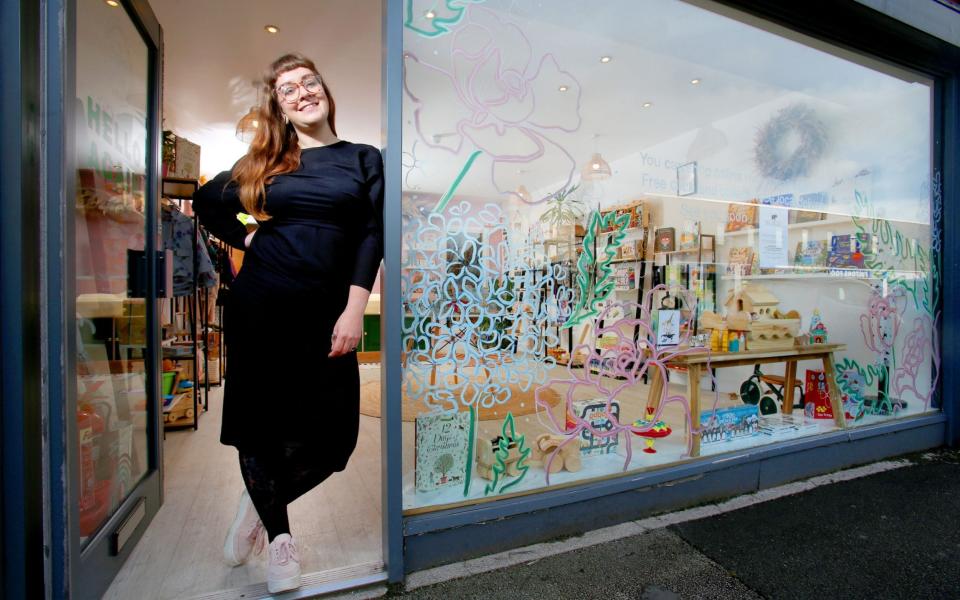
Hellen Stirling-Baker admits that the second lockdown came as a shock. She had done everything she could to make her ethical children’s store in the thriving Crookes Street area of Sheffield Covid-secure, and was anticipating that a successful pre-Christmas run could help end a difficult year on a high. And then she was forced to close her shop again.
It made Stirling-Baker determined to ensure that the local community could still support the other independent shops like hers in the area. So she posted her intention to create a shop hub on the local community Facebook group; the response was overwhelmingly positive. “That night I built my second-ever website, apart from my own. I sent loads of Google forms out to local stores and created shopcrookes.co.uk.”
The site is a hub for businesses in the area to show what they’re offering during lockdown; click and collect from the local florist, opening times for the DIY store and card shop, the takeaway menus of the local cafés. “We’re getting funding to help us with advertising, but I wanted to show that we’re all in this together and trying to get through this crucial period.” Crookes Street usually has a heaving Christmas market that won’t go ahead this year.
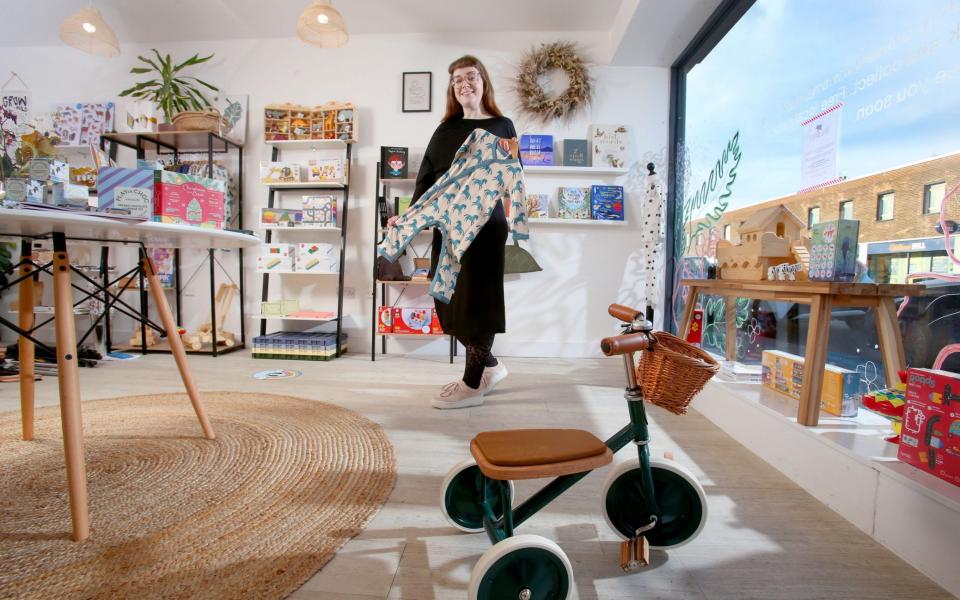
“We want to make sure people remember to shop local,” says Stirling-Baker. She was already hard-wired into the local community due to the children’s groups she runs from Small Stuff, but says the response has been wonderful. “People are excited that their local area is doing something different.”
Small Stuff and other businesses are offering Covid-safe local deliveries, as well as kerbside collection. Meanwhile, she has put everything she sells online. “It was a mammoth task.” She’s had orders from as far as London and Scotland, but it’s the local economy she’s interested in. “Any order that comes through is exciting, but I want to keep the local connection alive.”
‘We feel part of people’s lives, but can only survive if they buy’
Gill Edwards, 57, owner of The Little Ripon Bookshop, Ripon
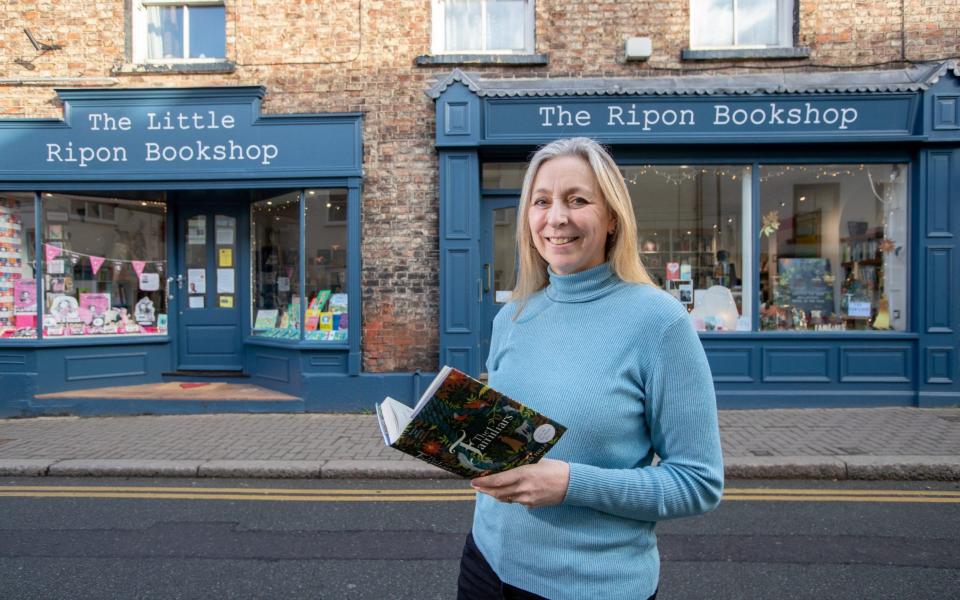
Last week Gill Edwards received an email from a customer more than 200 miles away in the South East of England. He had decided to adopt her as his local bookshop on bookshop.org. He couldn’t find a local bookshop, but he was born in Yorkshire and after looking at her website was so impressed that he was going to use Little Ripon Bookshop from now on.
“It was lovely, it made me smile and I shed a little tear at the same time, which I needed really,” says Edwards. “It’s a feel-good thing when someone likes the look of what you’re working hard to do.”
Edwards and her family moved from Somerset to Ripon 13 years ago. Her dream was to open a bookshop and while the North Yorkshire town had a beautiful cathedral, it didn’t have a bookstore. The Little Ripon Bookshop opened in 2009 and in 2018 it expanded into the premises next door. Having a website wasn’t new, but during the pandemic it’s been pivotal to carrying on as normally as possible. They’ve added hundreds of titles to their site. Their lively book club has moved on to Zoom, and they’ve held online events with authors such as Cressida Cowell that have reached customers around the world.
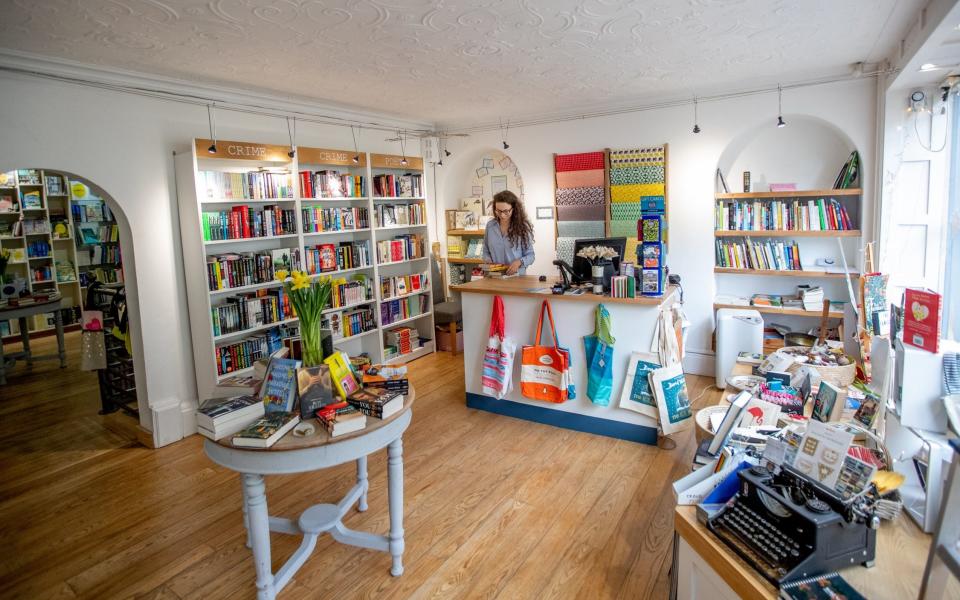
The second lockdown has hit Edwards hard, but she says: “It’s our job to encourage people to carry on using us and to get the message out that we’re still here and still operating. And we’ve still got fabulous books.”
The shop windows look more enticing than ever and Edwards has instituted QR codes so that window-shoppers can make online purchases there and then.
“People can click and collect, email, phone, anything they want to collect,” says Edwards. “We’ve got beautiful wrapping paper for people to choose from.”
Edwards hopes it isn’t too arrogant to say they’re an important part of the town. They’ve seen local children from when they’re born to secondary school, and they’ve been to funerals of some of their favourite customers.
“You really feel like you’re involved in the community and part of people’s lives. But we can only survive if people buy books from us.”
‘Online was always going to dominate’
Jenny Maxwell, 35, owner of Nordic Muse, Manchester
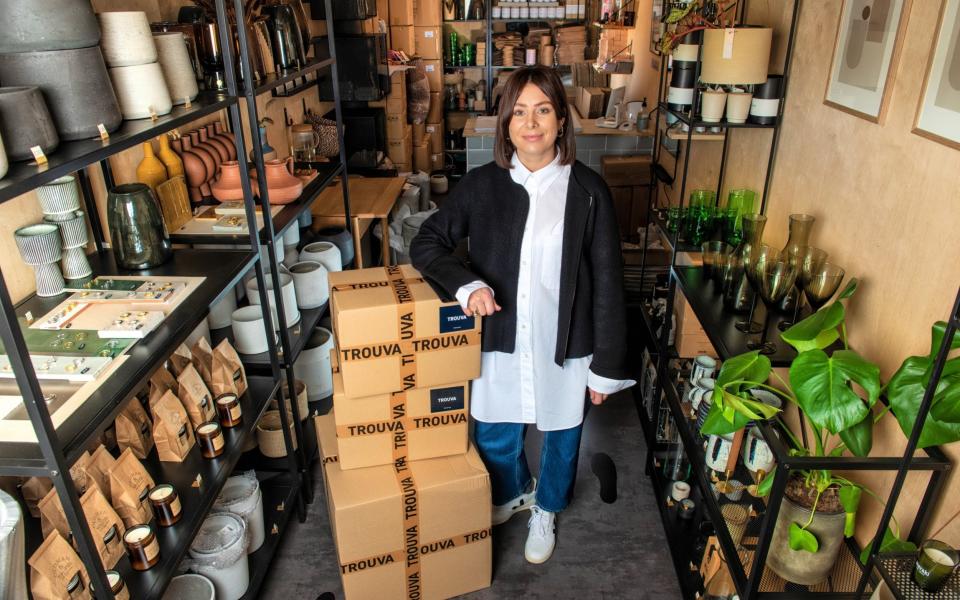
Jenny Maxwell spent the first lockdown sending items from her home in Manchester, while her boutique on the city’s Oxford Road sat empty.
“It was like living in a distribution centre,” says the 35-year-old. Overnight, the busiest street in Manchester, with a footfall of 30,000 a day, had gone into hibernation. Rather than panic, Maxwell stayed positive. As a result the online part of her business is up 700 per cent. “It’s staggering,” she says. “A bigger challenge for us has been controlling that demand.”
Maxwell started selling jewellery at local artisan markets before investing in her own bricks and mortar in 2018. Local trade has been crucial to orders through her website, with 80 per cent of her customers in the Manchester region. In March, though, she made the quick leap to selling on Trouva and hasn’t looked back. It’s enabled her to sell larger homeware items that would have had prohibitive delivery costs.
“I opened a physical store because I love the personal service in retail, but I think it was inevitable that online was always going to dominate the landscape. Covid has been the catalyst for that, but that doesn’t mean offline isn’t important.” Her customers might purchase through Trouva, but they can opt to click and collect at the shop. “Rather than thinking of everything as separate channels, offline and online, we’re thinking of all of them working for the overall picture,” she says.
But she says she knows of other small businesses that haven’t embraced the change quite as quickly as Nordic Muse. A background in ecommerce, she says, helped her to have some early insight.
‘We couldn’t do without the tourism – and all of a sudden we didn’t have it’
Ingrid Tait, 58, The Longship, Kirkwall, Orkney
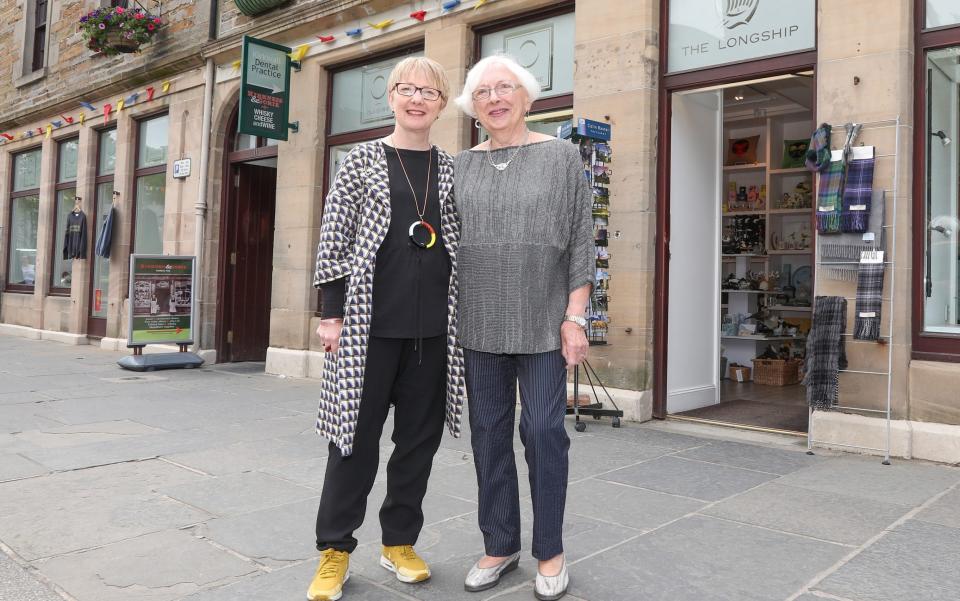
Ingrid Tait had been meaning to build a website for her beautiful boutique on Orkney. But a steady stream of tourists to the Scottish island kept her too busy. She and her husband Duncan kept putting it off until suddenly the boats stopped arriving. Covid-19 had hit.
“We couldn’t do without tourism and all of a sudden we didn’t have it,” says Tait. Her family have a 161-year history on the high street in Kirkwall. In 1859 her great-great-great-grandfather started as a grocers’ shop and wine merchant, a side of the business Duncan still runs. Each generation, though, had its own ideas. Ingrid’s mum Ola Gorie started a jewellery store in 1961, earning an MBE for her contribution to modern Scottish jewellery. Ingrid, who trained in textile design at the Royal College of Art, chose to diversify into textiles she designs herself or sources. The Longship showcases the best of Orcadian creativity.
And while her and Duncan’s daughter Cara, home from university, built them a beautiful website to show it all off, making the most of blogs and Instagram, with a population of 22,000 (“You’re never going to make a huge living from just satisfying those customers,” says Duncan) they knew they needed to reach beyond their own shores.
Ingrid had long had her eye on Trouva, finding it an inspiration for planning trips to cities like Bristol and Edinburgh. After seeing The Longship’s website, Trouva was keen to have them on-board. Since July they’ve been sending orders out across the UK and Europe via that platform.
“Online is now 50 per cent of what we’re doing and it’s growing, whereas bricks and mortar are bumping along the bottom,” she says. “We’ve a long history, but a history that sees reinvention every so often. And Trouva and online is our latest reinvention.”
They’ve been able to retain all their staff. Thanks to Trouva’s logistics, they can have items with customers in two to three days. “We have a lot of Orcadian crafts because we’re proud of coming from here,” Tait says. “So if the tourists can’t come to us, we’ll take these goods out to the world.”
‘We will order something you like – not tut’
Phil Barton, 56, owner of Sister Ray Records, London

If you’re selling music, Soho is a great place to be. At least, it used to be. Before coronavirus, people travelled from all over the world to London for holidays and concerts, and drifting into a record store in one of the buzziest parts of the capital was all part of the experience. Sister Ray records has been a stalwart of the area for 31 years, occupying three different sites on Berwick Street at different times.
But in March their whole world changed, says owner Phil Barton. Soho, and central London’s travel Zone One, emptied. “Trading from Marble Arch to Canary Wharf was down by 60-90 per cent,” he says. “Anyone who’s paying rent in these parts of London will tell you that’s totally unsustainable.”
Sister Ray has adapted by expanding the range of what they sell online and redoubling their presence on social media. They already prided themselves on their customer service, but now work even harder to answer queries within 24 hours.
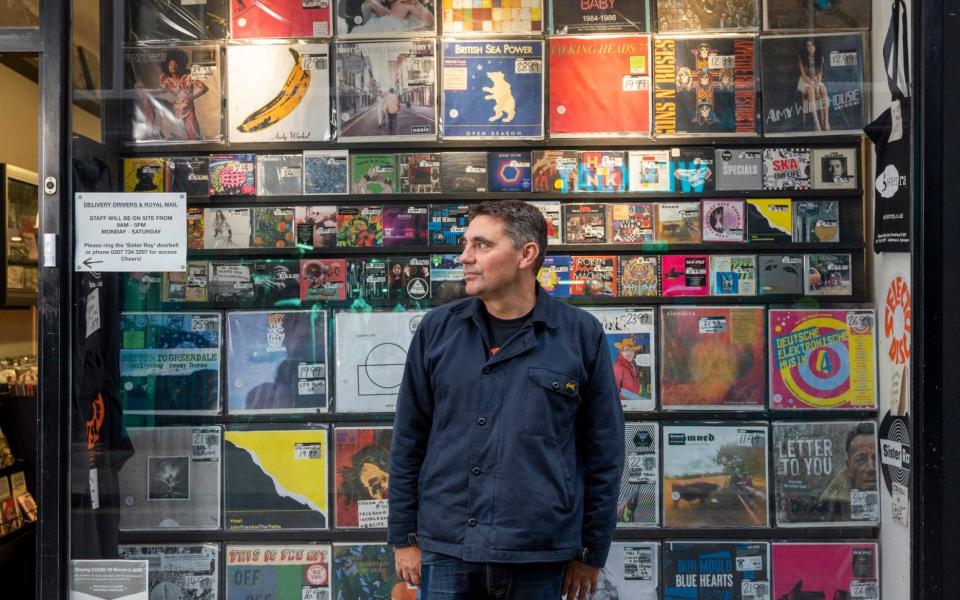
They have needed new stock control systems, and renegotiated accounts with delivery firms.
If you’re on one of the staff’s route home from work, you might get your record through your door that night.
Barton feels strongly that indie record stores offer a service that big onliners like Amazon can’t. “We know certain customers will only be interested in certain things. You don’t get that online – you get a crazy algorithm that tells you that the person who bought Florence and the Machine also bought Motörhead, whereas we know they’d probably like Phoebe Bridgers.” He hates the cliché of the aloof record shop owner, and encourages consumers to contact their local store rather than shop anonymously online.
“They will gladly order something in if they can get it. The myth that people will tut if you ask them – that doesn’t happen. We’re more than happy to order in things you like, and we’ll say, ‘Then you might like this too’.”
Andrew Greenacre’s tips for helping your local shops
Wait and buy Christmas gifts and festive items for the home in December, when all shops are likely to be open. There will be more choice, better quality and better value available.
Many closed shops are still available for click and collect: visit websites, call the shop, look in the windows while taking your daily exercise.
Online, scroll down your search and look for your local business. Eighty per cent of indies have a website.
Search by shop name and not by product name.
Spend locally. For every £1 spent in an independent shop, 63p is recycled into the local economy (compared to 40p for a large chain).
Leave a review of an independent retailer on Google, especially if it was a positive experience.
Check social media – Twitter, Facebook etc. Indies are good at informing the community this way.
Think of the environment – local click and collect cuts traffic and pollution.
Shopping independently is not just for Christmas! These shops need your support all year round.

